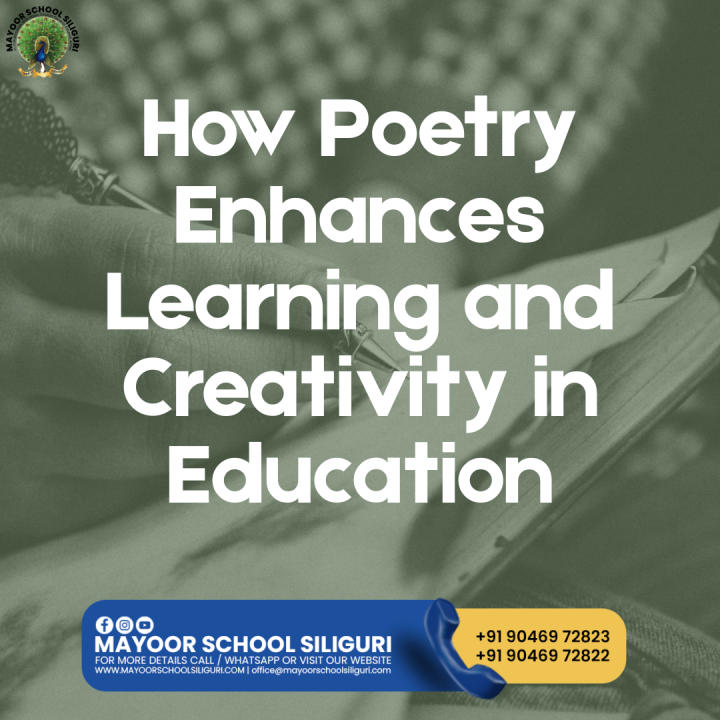
“When power leads man toward arrogance, poetry reminds him of his limitations. When power narrows the area of man’s concern, poetry reminds him of the richness and diversity of existence. When power corrupts, poetry cleanses.” John F. Kennedy Poetry is often regarded as the heartbeat of human expression, a rhythmic and evocative form of communication that transcends mere words. UNESCO established World Poetry Day on March 21st to celebrate the linguistic diversity and cultural richness embedded in poetry. But beyond celebration, poetry serves as a powerful educational tool, enhancing cognitive skills, emotional intelligence, and creativity in students of all ages. The integration of poetry into the curriculum does more than just refine literary skills, it deepens comprehension, strengthens critical thinking, and fosters self-expression. As poet T.S. Eliot once remarked, “Genuine poetry can communicate before it is understood.” This statement underlines poetry’s intuitive nature, making it an accessible yet profound means of learning. Research indicates that poetry significantly improves vocabulary and linguistic dexterity. A study published in the Journal of Early Childhood Literacy found that exposure to rhymes and rhythmic patterns in poetry enhances phonemic awareness, a critical component of early reading development. Poetry also introduces students to varied linguistic structures, metaphors, and syntactic complexities, which in turn refine their writing abilities. As Robert Frost eloquently put it, “Poetry is when an emotion has found its thought and the thought has found words.” Unlike prose, poetry often demands deeper interpretation. The multiple layers of meaning in a poem cultivate analytical skills by requiring students to decipher symbolism, tone, and intent. A study in The Reading Teacher journal found that students who engage with poetry develop stronger inferential reasoning skills, as they must read between the lines and interpret abstract ideas. Through poetry, students learn to appreciate ambiguity which is a vital skill in both academics and real-world problem-solving. Emily Dickinson’s lines, “Tell all the truth but tell it slant,” exemplify poetry’s unique way of revealing deeper truths subtly and creatively. Poetry has a profound capacity to resonate with emotions, making it a tool for developing emotional intelligence. A study from the International Journal of Education & the Arts highlights that poetry enables students to articulate their emotions more effectively, leading to increased empathy and emotional resilience. By engaging with poetry from diverse cultures and perspectives, students develop a broader understanding of human experiences. As the late poet Maya Angelou expressed, “We are more alike, my friends, than we are unalike.” Such literary exposure fosters tolerance, compassion, and a global perspective. Poetry dismantles conventional thinking and invites students to experiment with language. Its open-ended nature encourages playfulness with words, rhythm, and form, enabling students to express themselves without rigid constraints. A study from Psychology of Aesthetics, Creativity, and the Arts reveals that writing poetry activates regions of the brain associated with creativity and emotional processing. In other words, composing a poem is not just an academic exercise but a cerebral and artistic endeavor that stimulates cognitive flexibility and originality. - Interactive Poetry Readings — Organizing poetry slams and readings in classrooms fosters engagement and appreciation. - Cross-Disciplinary Approaches — Integrating poetry with history, science, and philosophy can enrich learning experiences. - Writing Workshops — Encouraging students to create and share their poetry builds confidence and communication skills. - Exploring Multicultural Poetry — Introducing poetry from diverse backgrounds promotes inclusivity and cultural awareness. As World Poetry Day reminds us, poetry is not just an art form, it is a powerful educational tool that nurtures intellect, emotion, and creativity. It refines language, sharpens analytical skills, fosters empathy, and liberates the imagination. At Mayoor School Siliguri, the best school in Siliguri, we encourage students to embrace poetry as a means of expression, reflection, and discovery. Let’s celebrate the beauty of words and the power of imagination! Perhaps, in the words of Pablo Neruda, “Poetry is an act of peace.” In an era that often prioritizes rigid structures and standardized testing, integrating poetry into education offers students the opportunity to think, feel, and create, essentials not just for academic success but for richer, more profound human experiences.Poetry as a Catalyst for Learning
1. Enhancing Language and Literacy Skills
2. Developing Critical Thinking and Interpretation Skills
3. Fostering Emotional Intelligence and Empathy
4. Encouraging Creativity and Original Thought
Implementing Poetry in Education
Read More Article: Today's Education System: Book Vs Practical Learning